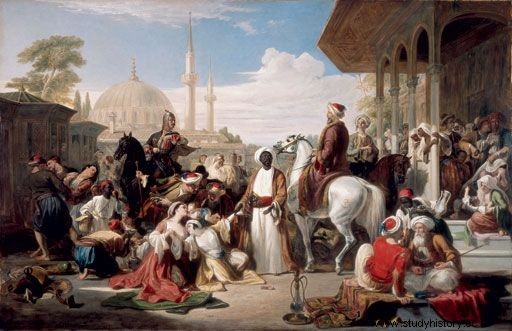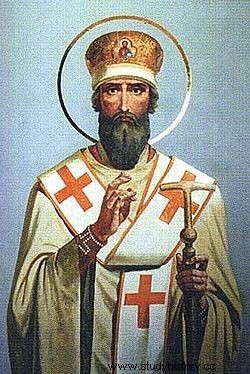While American historians are famous for using words incongruous with the era in their books, the Soviet Union does come to mind when reading "The Book of Heraclides of Damascus".

Constantinople. Capital of a totalitarian state?
While American historians are famous for using words that are incongruous with the era in their books, when reading "The Book of Heraclides of Damascus", the Soviet Union does come to mind.
In the late 1940s, Constantinople, the capital of the Eastern Roman Empire, was the scene of a fierce religious dispute between two religious dignitaries:Eutyches (an archimandrite with considerable influence at the court) and Eusebius (bishop of Doryleum). Just a few years ago, two gentlemen jointly overthrew the capital patriarch, Nestorius (yes, the one from Nestorianism). Now they were divided by a new doctrinal and personal dispute. We will not delve into the issues of faith, so as not to get bored and unnecessarily complicate the text. Suffice it to say that, according to Eutyches, the views of Nestorius were not dealt with sufficiently firmly, while Eusebius presented a more subdued approach. Characters were perhaps more important than beliefs. Philip Jenkins, author of the recently published overseas book "Jesus Wars", introduced Eutyches as follows:
He owed his position in the church (...) in part to his oratory skills, but this talent was not necessarily just a blessing. The Archimandrite was characterized by a completely relentless style of dispute, a sharp character, and a tendency to perceive all critics as wicked people, if not helper of the devil.
Byzantine Police State
How was this ancient dispute over the principles of faith? One might think that it was in the quiet of the lecture halls, at lengthy meetings of learned husbands, and in common prayer. Well, the reality was completely different.
Eutyches led the monks into the streets, who shouted out the already timid Patriarch Flavian. He aimed his attacks at each critic separately and at all of them together. The capital city quickly came under his rule. This by no means calmed the situation down. According to Jenkins, in AD 447-448 there was an atmosphere straight out of a police state in Constantinople . A period source, "The Book of Heraclides of Damascus", seems to confirm this:
[Eutyches and his associates] killed some people on ships, others on the streets, others still at home, or on their knees while praying in churches. Still others were chased so that they escaped. And with all their zeal, they searched for and looked for those who hid in caves and holes in the ground. And great fear and danger accompanied the man who spoke to the followers of Flavian, because of those who lived in the neighborhood and kept watch and were spies watching who went to Flavian.
The Stalinist council of Ephesus

Flavian Patriarch. A victim of a robber synod. As for Eutyches, no likenesses of him have survived.
A similar terror system arose at the same time in Egyptian Alexandria. Eventually, in order to "ease" the disputes in the Church, a council was convened to Ephesus (AD 449), at which Eutyches had an unquestionable triumph. Participants were intimidated, monks obedient to Eutyches beat the rebellious, and "oppositionists" trying to write down how the proceedings actually proceeded ... fingers were broken. The Patriarch of Constantinople, the aforementioned Flavian, was imprisoned without any trial and beaten to death. Eusebius was also deprived of his liberty, but he managed to escape and survived.
How is it possible that over 130 church dignitaries signed up to such a council? Well, some Stalinist methods were used. According to later reports, monks and soldiers obeying Eutyches forced bishops to sign a blank "document" that was added later.
In the files of the next council (451) you can read the accounts of these dignitaries:
(...) we signed blank sheets. We suffered under the blows and signed (...) we were threatened with removal from offices. We were threatened with exile. Soldiers with clubs and swords stood above us.
Gangsters and ideologists
All decisions in Ephesus were withdrawn after two years, and the council itself was deleted from the history of the Church and contemptuously called "the synod of robbers." Eutychesa and the infamous role he played were also forgotten. This interesting episode in the history of Christianity is described by Philip Jenkins, whose book will soon be published in Poland by Bellona.
The author knows his stuff, so I'll leave it to him to consider religion. I am more interested in the entire system created by Eutyches and his ilk. Enraged crowd, charismatic orator (Eutyches), fanatical supporters of ideology (monks), plus an army of secret agents and informers, as well as ruthless political murders and executions without trial. Could the term "totalitarianism" really fit not only in the 20th century, but also in the fifth century? Eutyches could not be compared to twentieth-century dictators ...
Source:
- Philip Jenkins, Jesus Wars:How Four Patriarchs, Three Queens, and Two Emperors Decided What Christians Would Believe for the Next 1,500 years, HarperOne 2010 (premiere in Poland in the coming months; the translation of the above-signed book).
